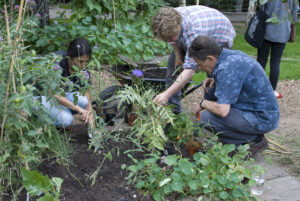Online Workshop on Friday 30th of April 2021 from 10am – 1pm

During the Covid-19 pandemic, people’s relationships with plant life have altered as has their use of urban green spaces. In UK cities, people have rediscovered public parks as spaces to meet up with friends and family, take a walk, and do sports. In doing so, many have found a temporary release from the stresses built up from being stuck indoors during the multiple lock-down periods. Also, the privileged who have had access to a private garden have found themselves spending a lot of time there, perhaps initiating an overhaul of garden design, introducing edible plants, or simply pottering about in-between online meetings. Whilst others have started to tend house plants; buying new ones, sharing pictures online, and as testament to their new devotion, ‘naming’ their house plants (Lasco 2020). Yet, access to green space, the possibilities for interacting with plants and its associated positive effects on well-being have been unequally distributed amongst neighbourhoods. For instance, the temporary closures of parks in London disproportionally affected people living in ‘deprived areas and those from BAME backgrounds’ (Duncan, McIntyre, and Cutler 2020). Contrary to the frequently uttered statement ‘We are all in this together’, the pandemic has not impacted on nor has been experienced by everyone in the same way, instead it has exposed and exacerbated structural inequalities and intersecting oppressions (Sobande 2020).
This workshop wants to connect debates on socially just urban futures (Imrie and Lees 2014) with reflections on the immediate and long-term impact of the pandemic on social life in cities by discussing the particular ‘site’ of the community garden. Community gardens carry the potential to provide a publicly accessible green and social space for people that want to engage with plants and absorb themselves in a social atmosphere. Due to the pandemic, however, these spaces have often had to close fully or partially or scale back their activities drastically. Within the context of UK austerity and its severe cuts on local authorities’ budgets, community gardens were already working with limited often self-generated resources and relied on voluntary work and contributions. Yet, the current crisis has made it even more difficult to keep these shared spaces cultivated and open to the public (van Duppen 2020). Additionally, social distancing and lock-down regulations have restricted the uses of public spaces and limited our exposure to their ‘unpredictability and inclusivity’ (Low and Smart 2020, 3). The pandemic has reshaped the geographies of encounter, instead of bumping into strangers outdoors digital technology has allowed us to invite the ‘stranger’ into our home, and thereby contact with strangers has become ‘a matter of choice as much as chance’ (Koch and Miles 2020, 2). As community gardens can also contribute to mitigating climate change, and enhance biodiversity in the city, these spaces provide fertile ground to reimagine a socially just sustainable urban future.
This workshop aims to think across disciplinary and institutional boundaries about the challenges faced by community gardens, with a focus on London. It brings together gardeners, scholars, designers, and local policymakers to discuss how to best support these valuable social green spaces that now more than ever face precarious futures, due to urban change, lack of funding, and the specific impacts of the pandemic. The workshop intends to engage with the Mayor of London’s Good Growth Agenda and make suggestions for future policy directions.
Speakers
-Amber Alferoff, London Learning & Development Manager, Social Farms & Gardens
-members of muf architecture/art including Liza Fior its founding partner, Professor of Architecture and Spatial Practice at Central Saint Martins and Mayor of London Design Advocate
-Louise Gates, coordinator at the Calthorpe Community Garden
-Dr Eleanor Jupp, Senior Lecturer in Social Policy, University of Kent
-Dr Les Levidow, Senior Research Fellow at The Open University
-Marie Murray, coordinator at the Dalston Eastern Curve Community Garden
-Dr Jan van Duppen, Research Fellow at The Open University
-representative of the Greater London Authority
Registration
Please register for attendance of the workshop here:https://www.eventbrite.co.uk/e/the-post-pandemic-sustainable-future-of-community-gardens-in-london-tickets-152124669983
Funding & Organisation
This workshop has been funded by the Economic and Social Research Council postdoctoral fellow grant ‘Working the Playground: Urban Gardens and Sustainable Futures’ (ES/S011455/1). It is organised by Jan van Duppen (the Open University) and Liza Fior (muf architecture/art).
References
Duncan, Pamela, Niamh McIntyre, and Sam Cutler. 2020. “Coronavirus Park Closures Hit BAME and Poor Londoners Most.” Guardian.
Duppen, Jan van. 2020. “The Challenge of Re-Opening a Community Garden – The Covid-19 Crisis and Access to and Uses of Green Spaces in Cities.” Design@Open.
Imrie, Robert, and Loretta Lees, eds. 2014. Sustainable London?: The Future of a Global City. Bristol: Policy Press.
Koch, Regan, and Sam Miles. 2020. “Inviting the Stranger in: Intimacy, Digital Technology and New Geographies of Encounter.” Progress in Human Geography.
Lasco, Gideon. 2020. “How COVID-19 Is Changing People’s Relationships With Houseplants.” Anthropology Magazine, no. 17 September 2020: 1–6.
Levidow, L. 2018. London’s urban agriculture: building community as a social innovation, International Journal of Sociology of Agriculture and Food 24(3): 354-376.
Low, Setha, and Alan Smart. 2020. “Thoughts about Public Space During Covid-19 Pandemic.” City and Society 32 (1): 1–5.
Sobande, Francesca. 2020. “‘We’Re All in This Together’: Commodified Notions of Connection, Care and Community in Brand Responses to COVID-19.” European Journal of Cultural Studies 23 (6): 1033–37.

Leave a Reply